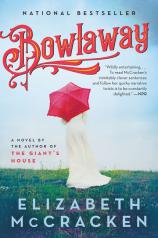Bowlaway
Review
Bowlaway
I confess that it took me a while after moving to Massachusetts to develop an appreciation for New England’s favorite indoor sport: candlepin bowling. Having grown up playing 10-pin, I couldn’t understand the crazily zinging (and easily palmed) wooden balls or the weirdly shaped pins, and I especially couldn’t comprehend that no one has ever bowled a perfect game.
Elizabeth McCracken, who focuses BOWLAWAY on this strangely endearing game, comments on this phenomenon early in the novel: “[N]obody has ever bowled a perfect string, every pin with every ball, all the way through, till you’ve knocked down 130 pins in a row, multiplied and transformed by math and bowling into a 300 game. Nobody’s got more than 5/6 of the way there. Nobody, in other words, may look upon the face of God.”
McCracken, who’s originally from Boston, clearly embraces this thematically rich peculiarity of candlepin bowling, along with its other quirks, as she centers her multi-generational exploration of one sprawling family on its history with the sport.
"The cast of characters is large, but thanks to McCracken’s skillful characterizations, they’re all unforgettable in their singularity, and her big-hearted canvas embraces them all..."
As the book opens in the early 20th century, Bertha Truitt is discovered lying, with no apparent explanation, in the cemetery in fictional Salford, Massachusetts. Bertha, who is alive and well but very cagey about how and why she got there, courts controversy almost from the beginning of her time in Salford by marrying the black doctor who revives her, opening a bowling alley that allows --- even welcomes --- women, and (gasp!) not wearing corsets. She is a larger-than-life personality, and her flagrant disregard for convention, coupled with her broad acceptance of all of Salford’s residents, in many ways sets the tone for the family who follows in her footsteps.
The cast of characters is large, but thanks to McCracken’s skillful characterizations, they’re all unforgettable in their singularity, and her big-hearted canvas embraces them all, even when they turn on each other (such as when a mother, scandalized by her son using the bowling alley to hook up with a young woman, hurls a candlepin ball at him, fracturing his ankle). The results are messy but glorious. Near the end of the book, Bertha’s daughter Minna calls her family’s belongings and, by extension, her family “a hodgepodge, a hash, a gallimaufry.”
BOWLAWAY traces the family’s schisms and reunions, its changes in fortune and in philosophy (a family member who predates Bertha’s time in Salford bans women from the bowling alley after her death, for example), its flirtations with tragedy and triumph. “Colorful” doesn’t begin to describe the people and incidents McCracken chronicles here. One character perishes in Boston’s Great Molasses Flood of 1919, while another is a victim of spontaneous combustion, and yet another could be said to have fallen victim to the Bowlaway itself (“A bowling alley is a warehouse for blunt objects”).
Throughout, McCracken stays true to what she writes near the novel’s opening: “Our subject is love because our subject is bowling.” Love persists, despite everything, as does the spirit of Bertha Truitt, whose wild, entrepreneurial spirit continues to reside in those whose lives she touched.
Reviewed by Norah Piehl on February 8, 2019
Bowlaway
- Publication Date: November 5, 2019
- Genres: Fiction, Historical Fiction
- Paperback: 384 pages
- Publisher: Ecco
- ISBN-10: 0062862863
- ISBN-13: 9780062862860




